CASUALTIES OF COMMERCE
Plea for Transnet to ‘slow down’ after train ploughs into four rhinos at Phongolo
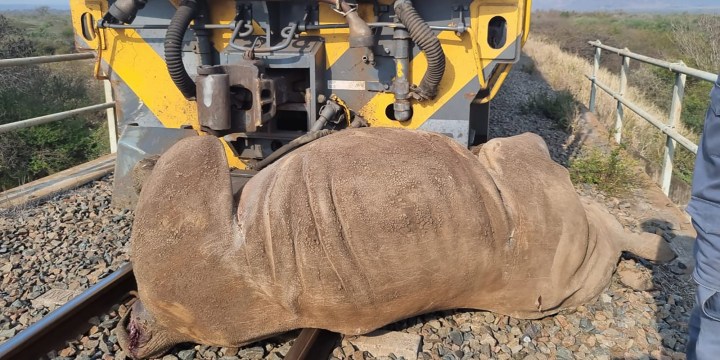
Coal and goods trains are leaving a trail of death and suffering in at least two wildlife reserves in northern KwaZulu-Natal as they speed southwards to the port of Richards Bay. Casualties from last Friday alone include two rhinos, a giraffe, a wildebeest and several impalas.
A Transnet locomotive slammed into a group of four white rhinos in the Phongolo Nature Reserve on 18 August, killing two and seriously injuring a third. The fourth rhino disappeared and its fate is not known.
On the same day, a wildebeest and several impalas were bowled over in the adjoining Phongola Game Reserve and wildlife managers also had to destroy a giraffe after one of its legs was all but sliced off, apparently by another train.
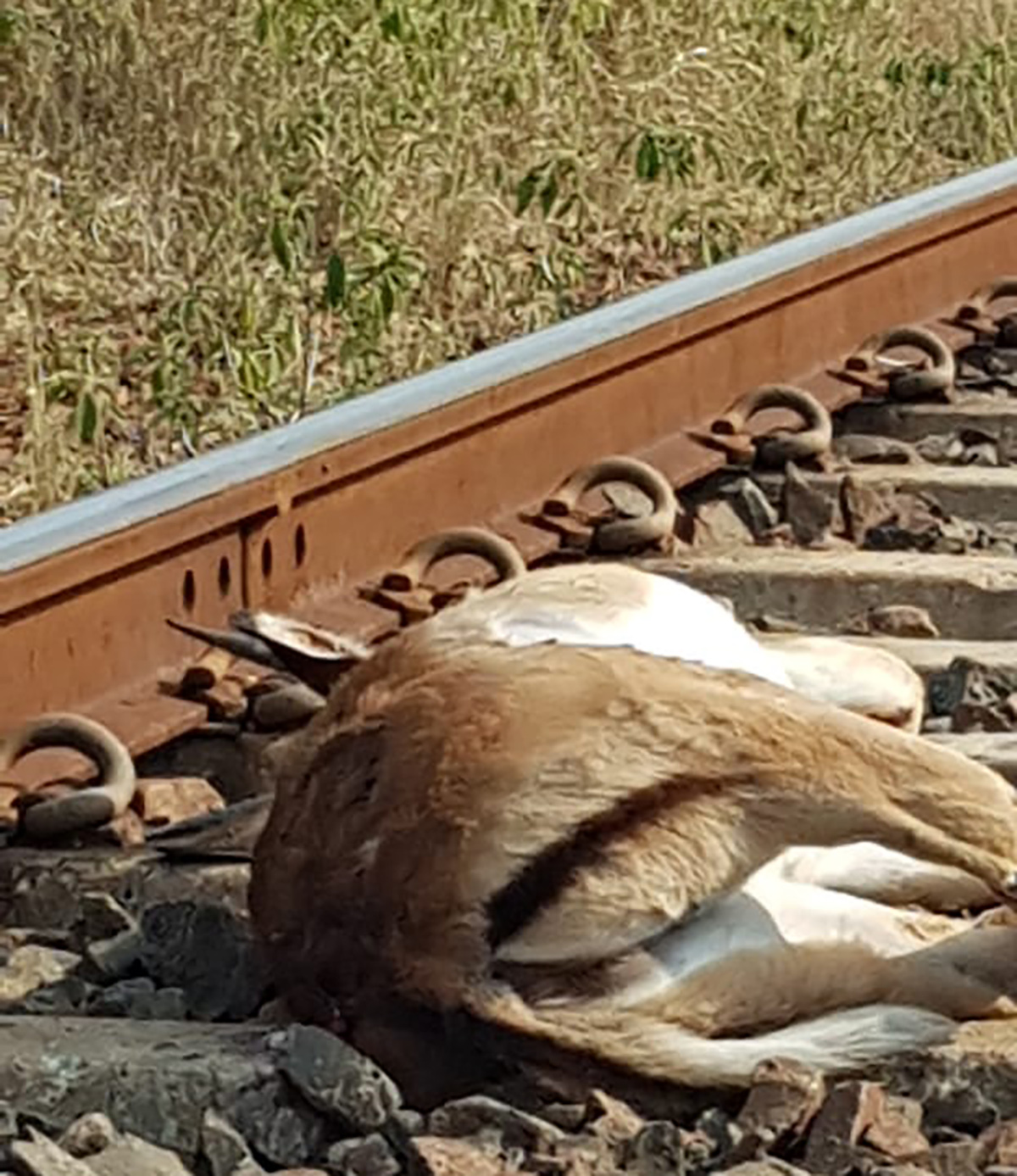
An impala killed on the track on 18 August 2023. (Photo: Supplied)
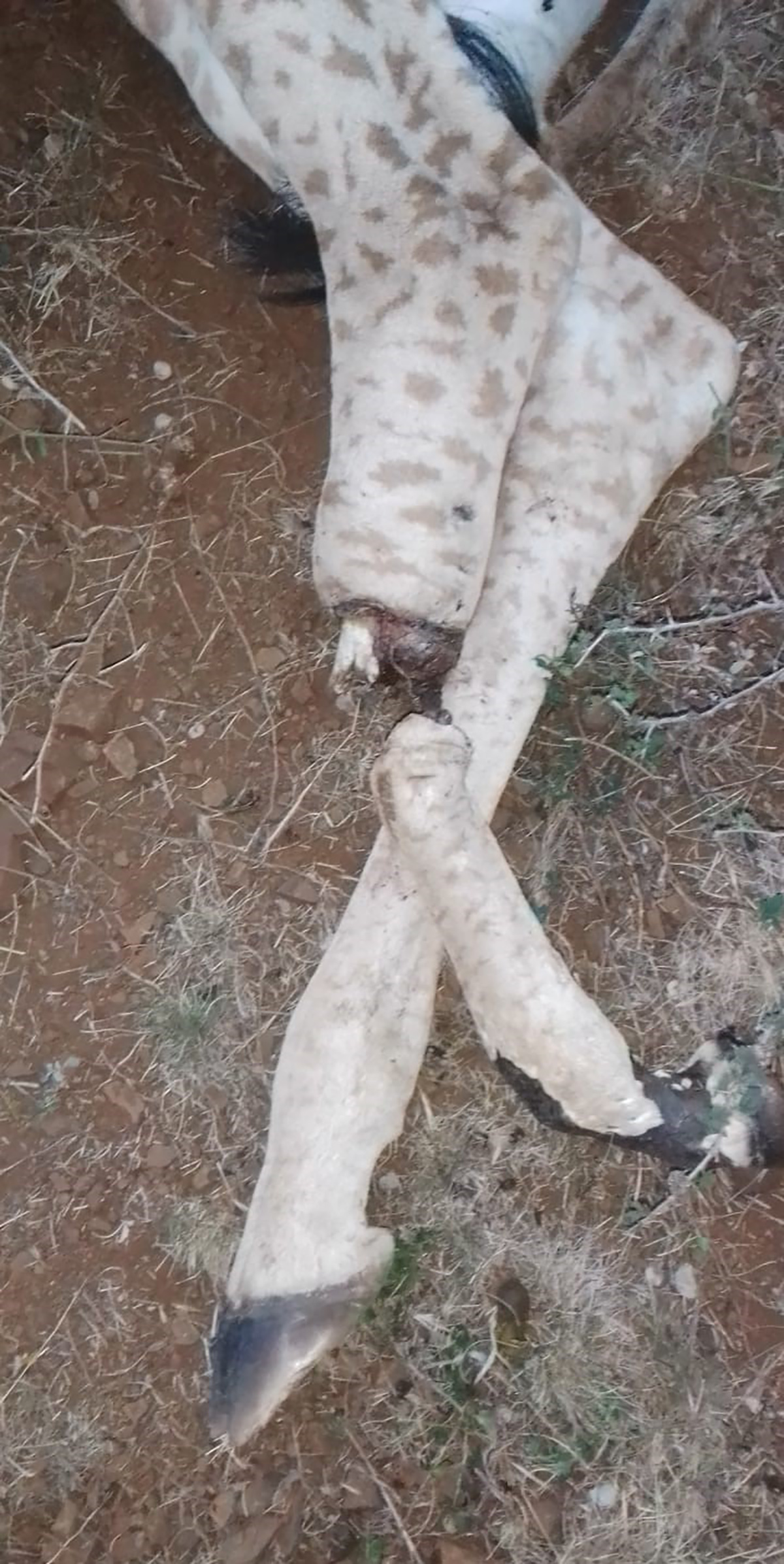
This giraffe, thought to have been struck by a train a few days previously, was put down by wildlife managers after one of its legs was all but torn off. (Photo: Supplied)
Now managers of the Phongola private reserve are urging Transnet to ensure that locomotive drivers slow down while passing through the reserve.
Reserve spokesman Kemp Landman said an agreement had been reached with Transnet about 10 years ago that locomotives would slow down to 40km/h to reduce wildlife casualties while travelling through the reserve. That agreement was reached after Transnet trains killed at least four black rhinos and an elephant.
Over recent months, however, Landman said the number of wild animal casualties in the private reserve had increased significantly, apparently because train drivers were no longer abiding by the speed limit along a roughly 20km-long section of track passing through the reserve.
Last week, a staff member who drove his vehicle along a track parallel with a train estimated the locomotive was travelling at least 70 km/h. A video clip recorded last week also suggests some Transnet drivers are not adhering to the agreement.
Reserve staff estimate that up to a dozen trains pass through the reserve daily, several at night.
The track from Mpumalanga to Richards Bay passes through Swaziland via the Phongola area and Hluhluwe.
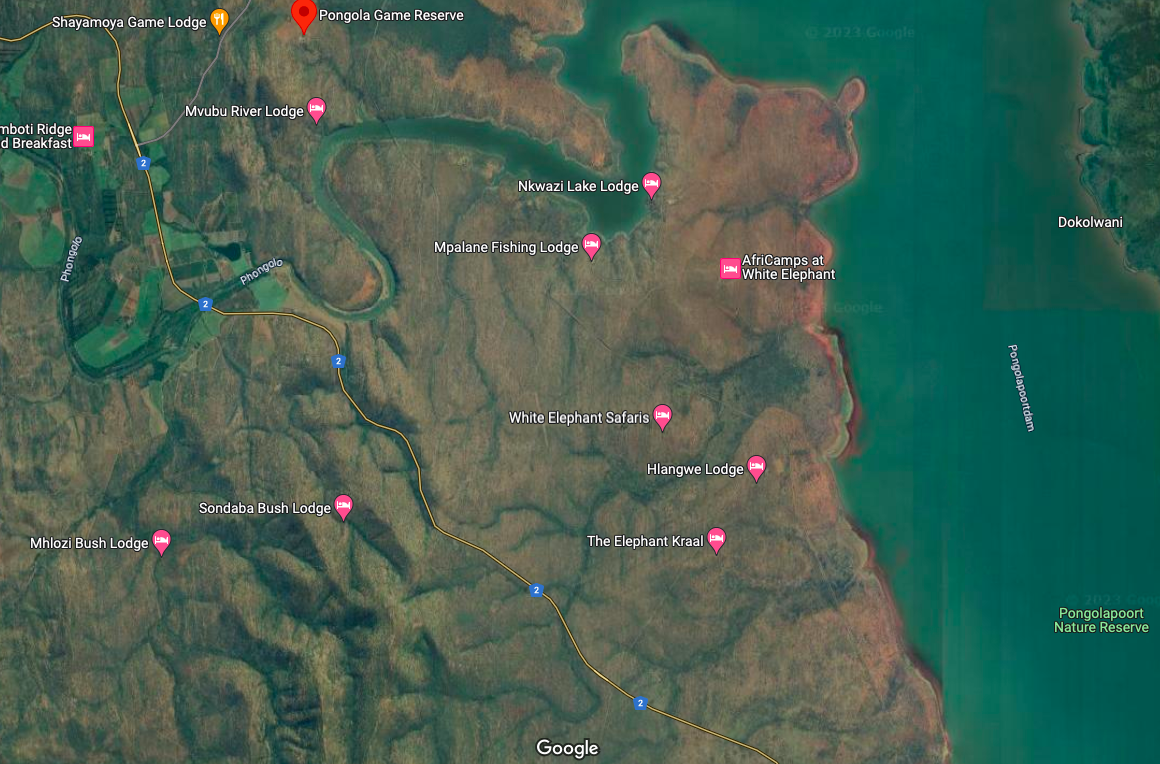
The railway line from Swaziland crosses the Phongola River before passing through two game reserves and then runs southward roughly parallel to the N2. (Image: Screenshot)
Musa Mntambo, a spokesman for Ezemvelo KZN Wildlife, confirmed that two white rhinos were killed, a third seriously injured and a fourth was missing after a train struck the animals in Phongolo Nature Reserve early on Friday.
Mntambo said Ezemvelo was investigating the incident and could not comment on whether high speed was a contributing factor.
Photographs suggest that the animals may not have been able to escape from the track quickly because of a steep embankment or the metal railings running parallel to the railway line on both sides of the bridge.
However, Landman has provided Daily Maverick with several photographs of a wide variety of other wild animals killed on the tracks in the adjacent Phongola private game reserve over the past year.
They include several impalas, an antelope species capable of outrunning cheetahs on open ground.
“(On Friday) we had about five or six impalas lying scattered and broken next to the rail track.”
Other recent casualties included eight buffalo, along with giraffe, kudu and wildebeest.
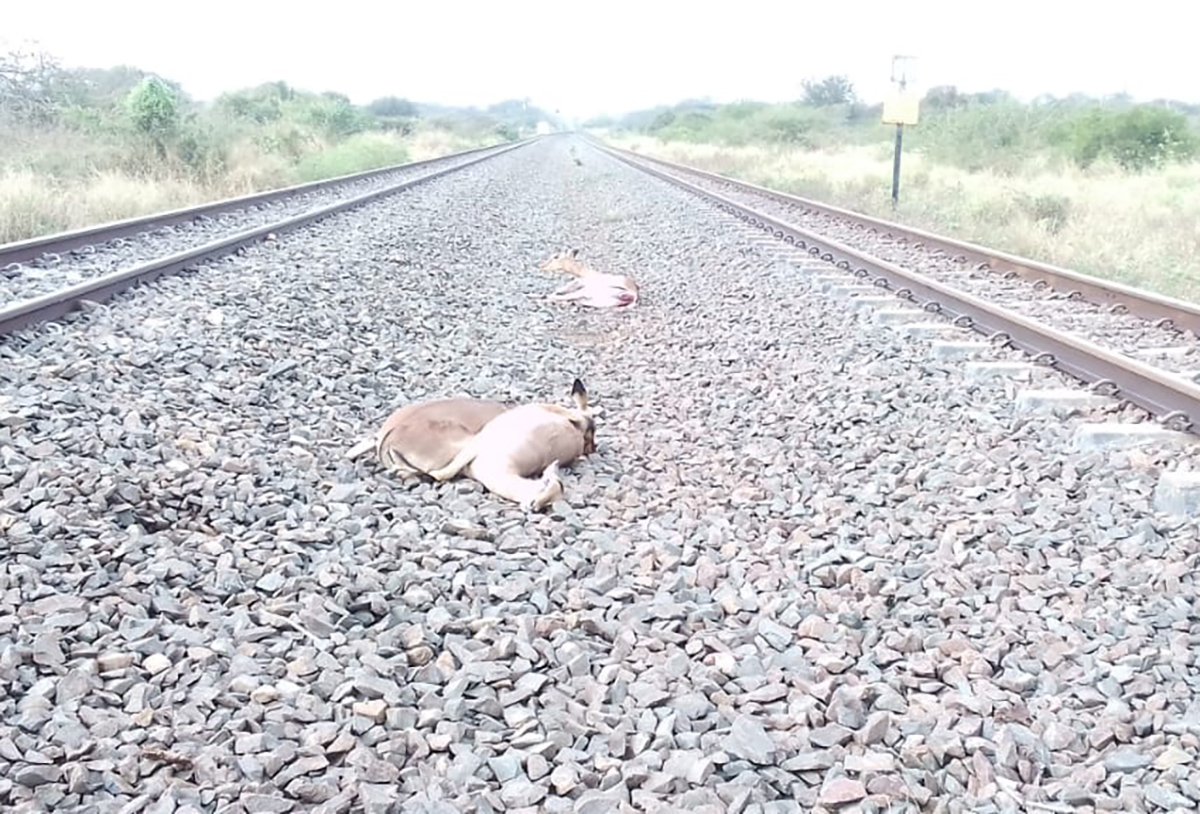
Three impalas lie next to the tracks. One appears to be still alive. (Photo: Supplied)
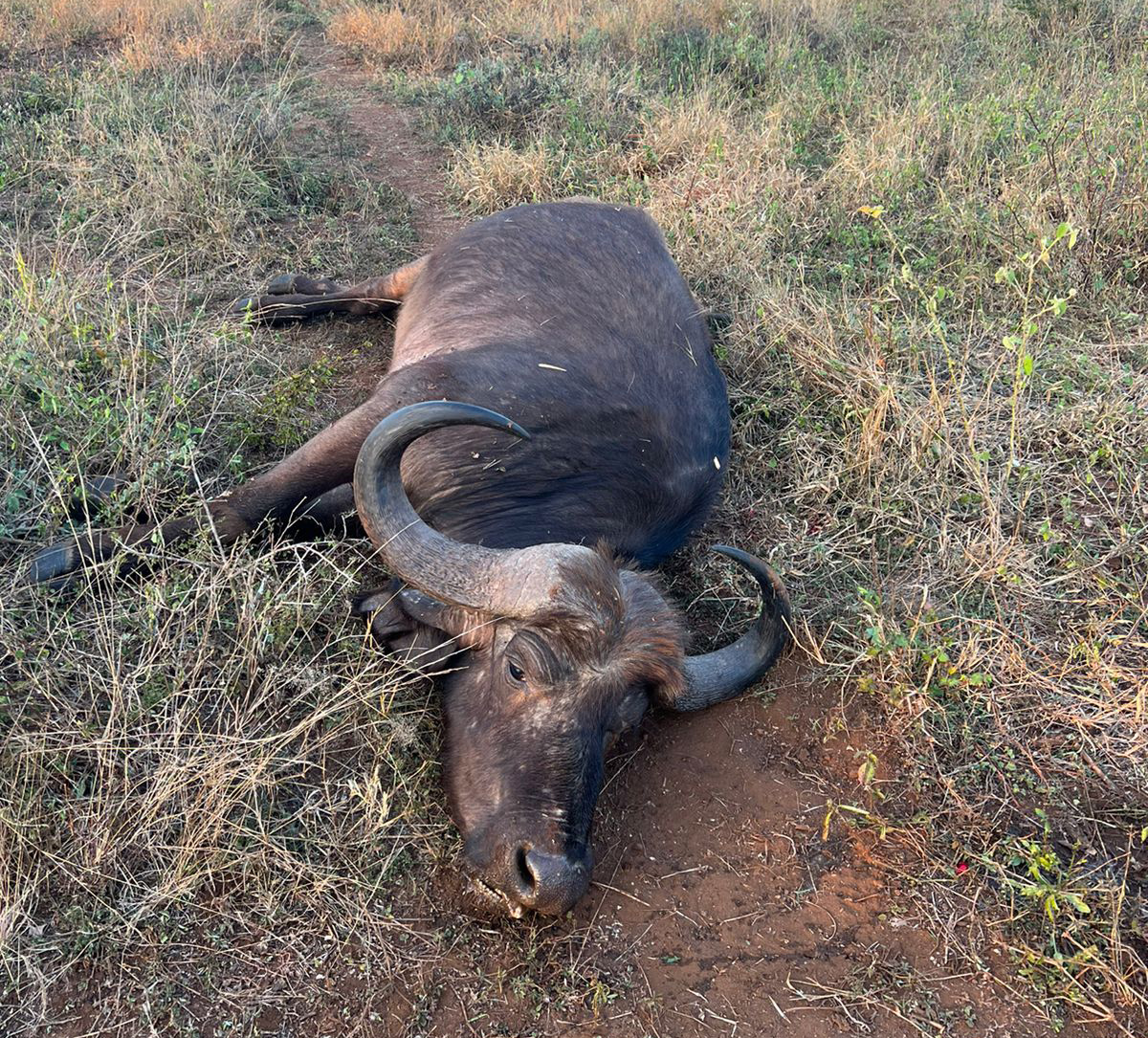
The carcass of a buffalo. (Photo: Supplied)
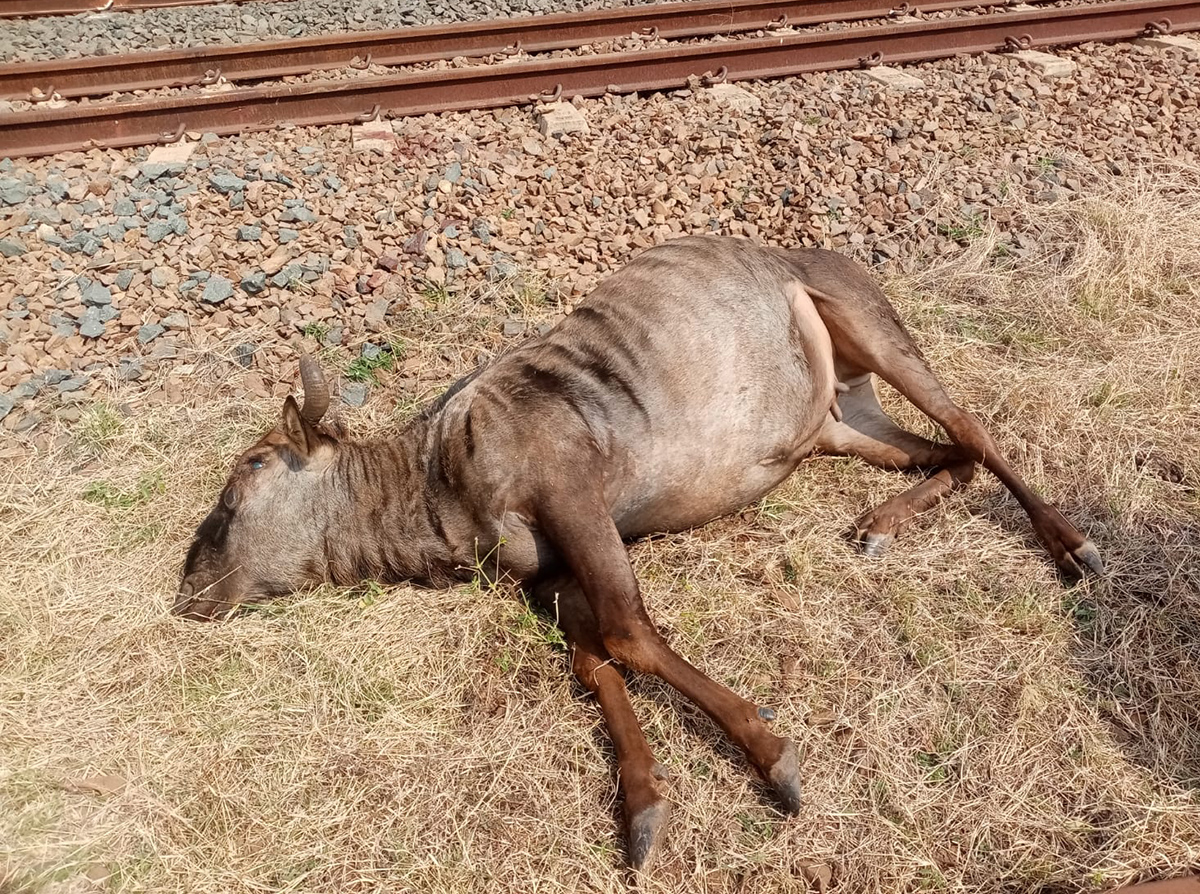
A dead wildebeest next to tracks. (Photo: Supplied)
“We believe this unnecessary suffering is an easy thing to solve. The railway track passing through the reserve is about 20km long. We understand that Transnet has a duty to customers to deliver cargo, but this is a game reserve and we are urging Transnet to instruct drivers to slow down along this short section of the route.
Landman said he was not able to comment on suggestions from other sources that Transnet drivers had been under pressure to speed up coal export deliveries to Richards Bay over the past year due to a surge in coal prices after Russia’s invasion of Ukraine.
Nevertheless, a plethora of road-haul trucks carrying coal from Mpumalanga and elsewhere have caused a traffic nightmare for residents of Richards Bay and for motorists along adjoining sections of the N2 highway over the past year.
Daily Maverick sent questions and requested comment from Transnet on 18 August, but no response had been received at the time of writing.
Dr Heinz Kohrs, a local veterinary surgeon and founder member of the Pongolapoort Biosphere Reserve, said there had been a definite increase in the number of wildlife killed by trains in the reserve over the past two months or so.
“It’s purely due to high speed,” he said. “I can only speculate on whether it’s because Transnet is pushing more trains on that line or whether there is a new contingent of drivers not sticking to the speed limit.
“What I can tell you is that the wildlife carnage stopped immediately after an agreement was reached with Transnet around 2012, that trains would stick to 40 km/h in the reserve to safeguard endangered species such as black rhinos.”
At a broader level, the increasing number of deaths of wildlife due to linear transport networks is gaining attention globally as conservation managers seek solutions to curbing wildlife deaths or allowing animals to move more freely as more transport corridors are fenced off.
A recent study by University of KwaZulu-Natal researcher Cameron Cormac found that at least 137 wild animals were knocked over and killed over a three-month period along the R618. This provincial tar road passes through the centre of the Hluhluwe-iMfolozi Park in KZN.
At least 103 animal deaths were recorded over the same period along the R22 road that passes through the iSimangaliso Wetland Park. These casualties included mammals, birds, reptiles and amphibians.
A few years ago, the Endangered Wildlife Trust (EWT), launched a project to reduce wildlife deaths along a railway line running through Balule Nature Reserve in the Greater Kruger National Park.
According to the trust’s website, this railway line extends over 45 km from Hoedspruit to Phalaborwa and posed a significant threat to local wildlife populations.
Since 2011 over 500 fatal wildlife-train collisions had occurred on the railway line, with casualties including black rhinos, elephants, wild dogs, hippos, cheetahs, lions, giraffes and white-backed vultures.
At the inaugural African Conference for Linear Infrastructure and Ecology in 2019, EWT researcher Wendy Collinson noted that several major development projects were planned or under way in several parts of Africa – ranging from power lines, roads and railways to pipelines and ports.
At a recent conservation symposium in Margate, KZN, Collinson said that while these projects benefited commerce, they often had negative impacts on wildlife by crisscrossing the landscape, fragmenting ecosystems, isolating wildlife populations or constraining movement and migration. DM


















I used to work that line over 35 years ago as a train driver assistant and the way speed is controlled on that track is by human input, eg: meaning you are given 30 minutes to go from station A to station B. Now to improve the amount of trains passing on that line so the railway can make more money is, tell the station master (a friend) to only input your signal later so that it looks as if you were not speeding, so you do not get fined. I would have thought that by now that line would have gone electrically controlled, meaning the system picks up what speed you are traveling as you move past certain route markers and if you are going to fast you will be met with a red signal, meaning you stop until it goes green. Our speed was 40km/h on that line and we could stop within +- 20m’s if you use the trains emergency brake, so we didn’t hit any animals or people, but that video clearly shows it is not doing 40 km/h. You want my advice? Monitor the stations better so you can see the times trains pass through them. Camera’s would work well.
This news story is so upsetting. It is not a difficult thing to avoid or at least reduce the carnage of our wildlife – as you point out Shaun. But always profit over compassion and ethics. Transnet, act responsibly please.
I’m not surprised Transnet didn’t respond.
It sounds like thus far, the Reserve and co. have taken the approach of talking to Transnet and asking them to show respect for animal life – resulting in the agreement which now is not being kept to. Perhaps it is time to rather be a bit less conciliatory and just present a monthly bill for the estimated replacement value of animals killed on the line? While it won’t bring them back, and can’t compensate for their pain, it might serve as a deterrent in the future.
Sue Transnet for the value.
The only risk with this approach is if they start crunching the numbers and figure out it’s worth crushing a few animals to get more trains through. Bit of a moral hazard thing there.
This is just heartbreaking –
‘The greatness of a nation and its moral progress can be judged by the way its animals are treated.’ -Mahatma Gandhi —
We are failing miserably in this regard
Transnet couldn’t get any lower on any level. God-awful people!
To be expected with the ANC goverment
Absolutely dreadful! Do they even care?